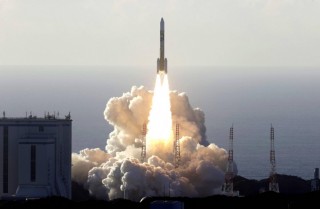Loading
Search
▼ Japan Launches First Arab Space Mission To Mars
- Category:Event
A rocket from Japan carried the first Arab space mission to Mars into space Monday, with the probe dubbed “Hope” successfully separating about an hour after liftoff.
Carrying a Mars orbiter developed by the United Arab Emirates, the H-IIA rocket launched by Mitsubishi Heavy Industries Ltd. lifted off at 6:58 a.m. from Tanegashima Space Center in Kagoshima Prefecture.
Almost exactly one hour later, a live feed of the launch showed applause in the control room as the probe successfully detached.
The project is the fourth in which Mitsubishi Heavy has conducted launches for overseas customers. It worked with South Korea in 2012, Canada in 2015 and UAE in 2018.
Monday’s liftoff marked the 36th consecutive successful H-IIA rocket launch.
In Dubai the launch was met with rapturous excitement.
Seeing the probe blasting off was “an indescribable feeling,” said Sarah Al-Amiri, the UAE Mars mission’s deputy project manager.
“This is the future of the UAE,” said Amiri, who is also minister of state for advanced sciences, from the launch site.
The Emirati project is one of three racing to Mars, along with Tianwen-1 from China and Mars 2020 from the United States, taking advantage of a period when the Earth and Mars are closest.
In October, Mars will be a comparatively short 38.6 million miles (62.07 million kilometers) from Earth, according to NASA.
Hope is expected to reach Mars’ orbit by February 2021, marking the 50th anniversary of the unification of the UAE — an alliance of seven emirates.
Unlike the two other Mars ventures scheduled for this year, it will not land on the Red Planet but will instead orbit it for a whole Martian year, or 687 days.
While the objective of the Mars mission is to provide a comprehensive image of the weather dynamics in the red planet’s atmosphere, the probe is a foundation for a much bigger goal — building a human settlement on Mars within the next 100 years.
The UAE also wants the project to serve as a source of inspiration for Arab youth, in a region too often wracked by sectarian conflicts and economic crises.
On Twitter, the UAE’s government declared the probe launch a “message of pride, hope and peace to the Arab region, in which we renew the golden age of Arab and Islamic discoveries.”
Dubai’s Burj Khalifa, the world’s tallest skyscraper, lit up hours before liftoff with a symbolic 10-second countdown in anticipation of the launch, which had been delayed twice by bad weather.
Several dozen probes — most of them American — have set off for the red planet since the 1960s. Many never made it that far, or failed to land.
The drive to explore Mars had flagged until confirmation, less than 10 years ago, that water once flowed on its surface.
Omran Sharaf, the mission’s project manager, has said the Hope probe will offer a special perspective on the elusive planet.
“What is unique about this mission is that for the first time the scientific community around the world will have an holistic view of the Martian atmosphere at different times of the day at different seasons,” Sharaf told a pre-launch briefing.
“We have a strategy to contribute to the global effort in developing technologies and science work that will help one day if humanity decides to put a human on Mars.”
He also expressed gratitude for Japan’s support of the project amid the novel coronavirus pandemic.
The UAE already has nine functioning satellites in orbit, with plans to launch another eight in coming years. In September, it sent the first Emirati into space on a mission to the International Space Station.
But the UAE’s ambitions go well beyond that, with a goal of building a human settlement on Mars by 2117.
- July 20, 2020
- Comment (0)
- Trackback(0)


